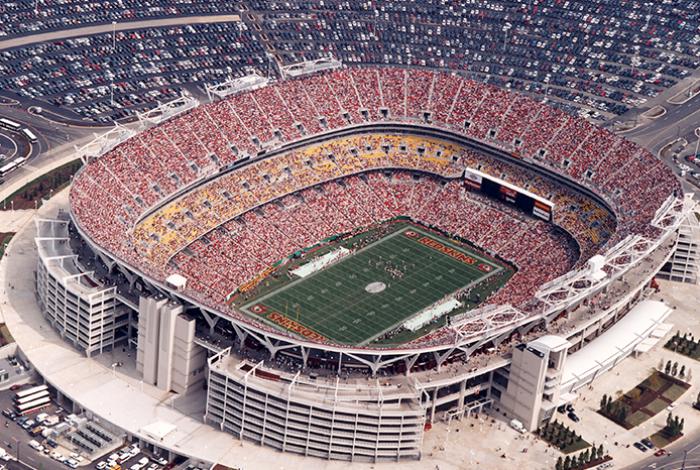
With Virginia, Maryland and the District of Columbia stepping up with various incentives toward a new Washington Commanders stadium, the NFL team is in the enviable position of being wooed while pursuing a new stadium and mixed-use development.
The Commanders ownership and management is following a familiar game plan and made the following pitch to all both states and the District: a renovated or new Washington Commanders stadium would be the centerpiece of a new multibillion-dollar development featuring retail, office space, sports betting, housing and more. And, given the mood of the times, proceeds from sports betting is a prime part of any plan.
Virginia took a first step toward wooing the Commanders with the creation of a football stadium authority, supported by large margins in both the Republican-controlled House of Delegates and the Democratic-controlled Senate. The authority would finance and construct a new stadium and spearhead a $3-billion development ($1 billion for the stadium, $2 billion for the development; these are the correct numbers despite some in the sports-business media loudly and incorrectly proclaiming Virginia was pushing a $3-billion stadium), likely in Loudoun County or Prince William County. There are some major financial enticements for the Commanders to make the move: the House would grant the team proceeds of a 2 percent sales tax and half the naming-rights proceeds until the stadium debt is retired, while the Senate would also give the team the sales-tax proceeds and all the naming-rights proceeds.
The Washington Post is reporting that Maryland is poised with its own plan to retain the Commanders at FedEx Field while offering enticement to owner Daniel Snyder to pursue development on the 200 acres he owns surrounding the stadium, backed by public financing. The Maryland Stadium Authority, which also funds improvements to Oriole Park and M&T Bank Stadium, would be involved on some level. From the Post:
While Virginia appears to have an early lead in developing an even bigger proposal, Maryland officials say Snyder’s existing land holdings, the stadium’s access to existing transit, the team’s long-standing relationships and a companion local-government incentive makes their deal competitive.
“The Virginia legislation appears to be designed to signal their interest,” said Del. Ben Barnes (D-Prince George’s), who chairs the capital budget subcommittee that would usher the Maryland proposal to passage. The team, he said, is “well aware of our interest and commitment to keeping them in Maryland.”
The team has not offered a timeline in making a decision, but it has been courting public officials in both states for months. The team’s Feb. 2 rebranding renewed the push to lure them.
In the case of the District of Columbia, D.C. Mayor Muriel E. Bowser may not have the financial resources to match these lucrative plans pushed by Maryland and Virginia. True, a return of the Commanders to the RFK Stadium site would certainly be a sentimental one, but what Bowser has suggested—a 50-50 split with the team for new stadium funding, similar to how MLS’s Audi Field was funded and financed—certainly is not on a scale with the sports-entertainment developments pushed by Maryland and Virginia. Congress would need to sign off on any large-scale development of the RFK Stadium site.
The next chapter for the Washington Commanders should be a return to winning, right here in DC. pic.twitter.com/FIk1F0QqRG
— Mayor Muriel Bowser (@MayorBowser) February 2, 2022
Which leads us to the huge elephant in the room: Commanders owner Daniel Snyder. The Commanders have been operating under a cloud for years for a variety of reasons, most recently as the target of a Congressional investigation over the team fostering a toxic work environment. The team did finally respond to calls to drop the racist Redskins branding—perhaps not in the most popular manner, with local fans actually preferring the Washington Football Team branding—but many supporting new-stadium development also predicated that support on some sort of resolution of the team’s issues. From the Virginian-Pilot:
During the Senate committee meeting, Sen. Adam Ebbin, D-Alexandria, said he wanted reassurance that the investigation’s conclusions would be made public.
“When you go into business with a billionaire and you are forgoing up to a billion in tax revenue, I just think it’s important to do due diligence,” he said.
These sports-centered developments, both big and small, are the wave of the future, pioneered by the Atlanta Braves’ Truist Park and the adjoining Battery. That multiuse development—retail, office space, hotel, and lots of residential—cost $400 million and has been hailed as an economic success. The Oakland A’s are pursuing an even more ambitious $11 billion ballpark-centric development on downtown Oakland’s waterfront. In the NFL, it looks like Nashville and the Tennessee Titans will shift focus to a new stadium and waterfront development at the Nissan Stadium site, while the Chicago Bears, famously, are looking at a major mixed-use development in Arlington Heights to leverage team assets.
Photo courtesy Washington Commanders.
